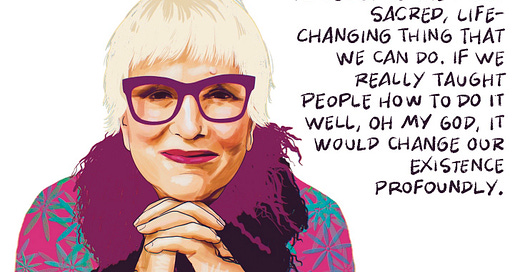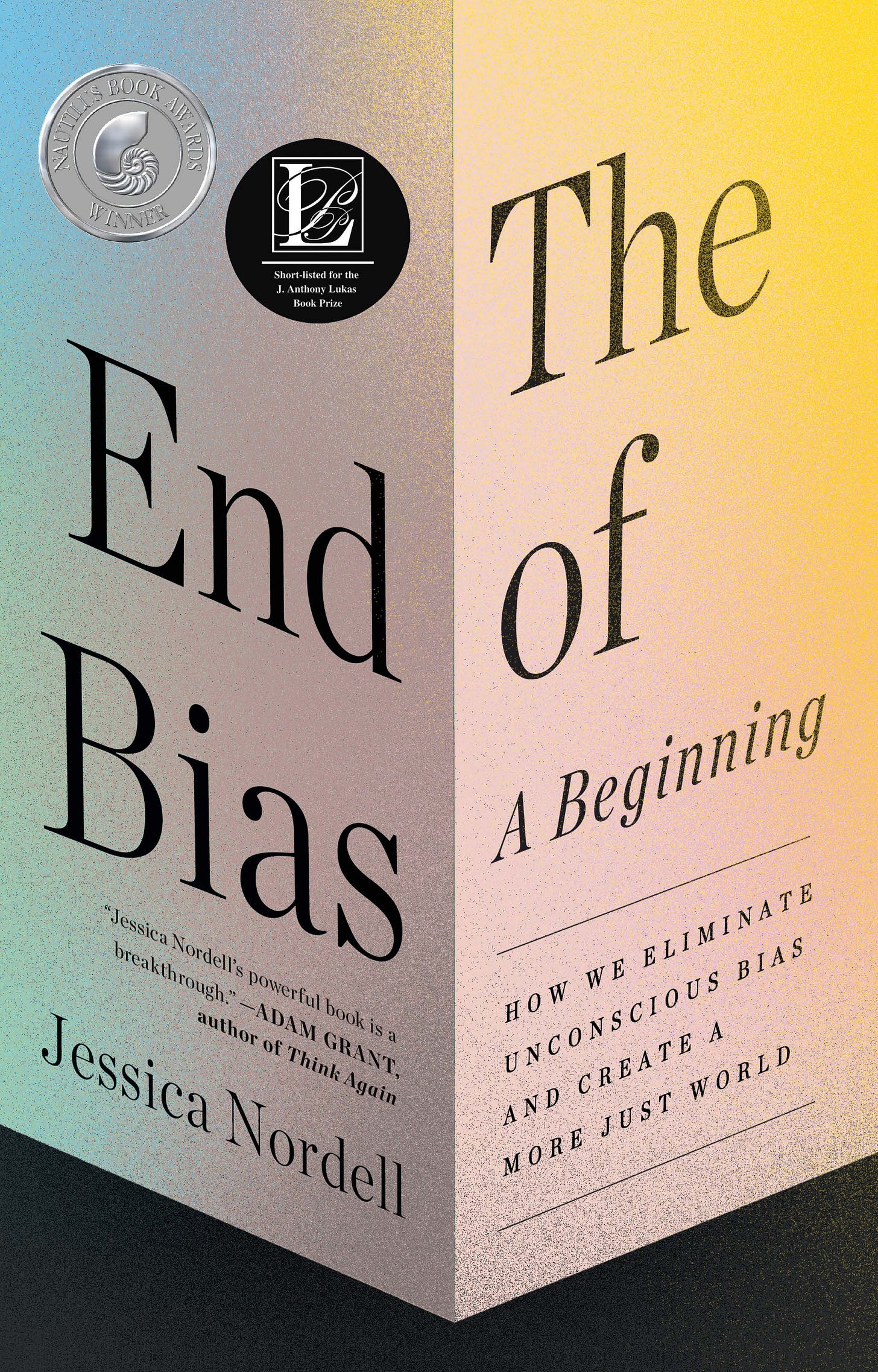V (formerly Eve Ensler) on Freeing Yourself From Someone Else's Story
And what happens when we apologize
How to introduce the legendary V (formerly Eve Ensler)? I remember, in college, the glee and disbelief with which I watched The Vagina Monologues (“I can’t BELIEVE they’re SAYING all this!”) It was transgressive and shocking then, and she has continued— unabated—nurturing silences into speech. A playwright, author, and activist who has listened to and uplifted the voices of countless women, she cofounded City of Joy, a women’s healing and leadership center in eastern Congo. More recently, V turned her listening inward, publishing The Apology, an imagined apology from her father, who physically and sexually abused her. No longer wanting to carry his surname, she changed her name to V. Her new book of collected writings, Reckoning, is a testament to a life of ever-deepening wisdom. V was named one of Newsweek's “150 Women Who Changed the World.” We spoke about repairing ruptured relationships, men’s biggest taboo, and what apologies do for the receiver— and the giver.
You describe interviewing a person as a “sacred social contract.” At its best, it’s a profound exchange. At worst, it can feel extractive. How has your approach to interviewing evolved to be more of an exchange?
In the early days I didn't know what the hell I was doing. I wanted to hear, I wanted to know, but I felt like I needed some kind of shield or persona. I realized that people didn't need me to be doing that. What people needed was for me to be present. They didn't need me to save them, or to offer my opinion. What they needed was for me to listen.
I think we undervalue how significant that is for people. Many people-- most people I would argue-- are not listened to. They don't have a space where people actually hear them, where they can share in depth what they're feeling. That, in itself, is a sacred act. I don't know if there's a higher thing than listening. It takes years to develop that ability, to just be present. To take that person in, to hear them.
What I learned is that when you're present with people, they know it. And they will just go deeper and deeper.
We almost have this sixth sense that allows us to understand if someone is truly there or phoning it in. What is that?
It’s energy. I think listening is a kind of energy. A kind of attention. You can feel when somebody is there for you. And you can feel when they're distracted, or they've already made a decision about who you are, or are judging you. I think the work is to develop your ability to deepen your capacity and the expanse of your attention—which requires getting out of your own head. You have to be willing to be contradicted. You have to be willing to have any notion you have thrown up in the air. To be taken to places as you've never gone before.
You have to let go of your agenda for the other person.
Yes. That's the main thing. Nobody wants advice. People want you to cry with them, sit with them, hold their hand, care for them as they find their way to what they need to be doing.
I want to talk about women and violence. I appreciate how, in Reckoning, you directly address the reader's discomfort with this material. You write, “Please stay with me. This is going to be uncomfortable.” I felt like you were talking to me. I thought, “Ok, she’s asking me to stay with her. I want to hold up my end of the bargain, as the reader.”
Thank you.
I’m thinking about the recent CDC study about increasing levels of sadness and despair among high school women. You write, “When we talk about violence against women, it is so abstract, so broad, we don't realize the way it impacts our lives and how many years it takes to rise from the ashes.”
I was holding that in my head as I was reading the CDC study. The big headline was, “Teen girls are experiencing record levels of sadness, hopelessness, and violence.”
Putting the horror of that reality aside, this framing seems so obtuse. Could you imagine the headline, “Citizens are experiencing record levels of anxiety, fear, and having their houses set on fire”?
Exactly.
It put these facts side by side, as if they are separate, random weather events.
As if they weren't related.
has pointed out that sadness and hopelessness is girls' brains doing what they're supposed to do, which is raise a flag and say something is horribly wrong.Absolutely.
Why don't we have a CDC report called, “Teen boys committing record levels of sexual violence”?
Why is it so-called “violence against women” as opposed to “men committing violence”? Why isn't there an active person in the sentence-- the person who is doing the violence? Even the fact that it's women who organize around ending violence towards us is such an absurd notion.
So instead of asking you, like everyone is asking everyone, “Why are girls so hopeless? What are we going to do about these sad, hopeless girls?” I want to ask a different question. Why are boys committing more sexual violence now than at any time since the CDC started measuring this?
I think boys have always been committing violence. I think social media has absolutely escalated. Something like 90% of boys learn about sex from porn. Pornography, the internet, internet bullying, have all escalated boys’ violence and aggressiveness sexually.
I also think Covid did something very strange. People were locked in their houses. If you have any tendency towards a temper or violence-- and you had a lot of men who were feeling really bad about themselves, and inside their house all day. There must have been more violence generated in the home. Boys are repeating that.
I’ve also been thinking about how violence against women is eroticized. I read recently that almost half of videos on PornHub include aggression against women. Girls are experiencing sexual violence, and boys— as they’re developing sexual selves—are exposed to this eroticized violence.
Violence is saying, “I'm not weak. I'm in charge. And I don't have to have my feelings.” Vulnerability is being trained out of boys, even though we know that when boys are able to express their vulnerability, they crave it. I once wrote that bullets were hardened tears. It's what happens when you don't allow yourselves to connect to your heart, when that's been cauterized at a very early age.
I remember my husband telling me that he remembers the specific moment he taught himself not to cry. He was seven and watching a sad TV show. He’d learned it wasn't okay to cry. So he taught himself mechanically how to stop it.
Yes. So many boys go through that. It’s like the turn-off of your soul.
Are you willing to step into that scary terrain where you might try to understand him? Not justify him, because that's very different. People mistake understanding for justification.
You undertook this breathtaking project of writing the apology that you never received from your father, who abused you terribly. What did you understand about your dad as a consequence of going through that process?
I had never allowed myself to see my father’s vulnerabilities. I was much more comfortable monsterizing him. But of course, I was still in my father's narrative. Even resisting and fighting my father was being part of his story, not my story. Everything I did was to show him. One day I realized, I don't want to be in this story anymore. This is boring.
The way out of that was to say, well, who was my father? Are you willing to step into that really scary terrain where you might try to understand him? Not justify him, because that's very different. People mistake understanding for justification. I had never allowed myself to think that maybe something happened to him that turned him into that.
My father was a complete product of the patriarchy of his family and their demands. He never dealt with how bad he felt— never being seen for who he was, never allowed to dream his dreams. And then [there was] his horrible older brother who clearly abused him. He had nobody to turn to. So it just went underground. If you don't deal with it, either you become very depressed or you become a perpetrator.
What did it mean that he could never cry? Or feel for a bird that dropped from a tree, without getting beaten up? And then he had this daughter— this tender, vulnerable creature, and his feelings would get completely confused because he'd never allowed himself to touch into that vulnerability.
I had great compassion for him. I still hold him accountable for what he did to me. I also see that if we don't go back to the roots of violence, we will just keep living in it.
You said that to heal, “Survivors want and need their perpetrator to acknowledge the truth of what he has done.” That is such a hope-giving statement, because what you're saying is there is a path back. There's a path to repair.
Yes.
For the perpetrator, there is a path to redemption and reconnection to the human family.
Yes.
There is nothing as strong as the taboo against men apologizing. Nothing that I've seen. It's so radical.
And yet we’ve heard close to zero acknowledgment, zero apologies from the men implicated in #MeToo.
I wonder if one reason is that we’ve disincentivized apology. Our litigious culture encourages people to do everything they can to deny. Even if they're convicted, maybe they've denied it for so long, they've even denied it to themselves.
From the time you're a boy, you’re told never to apologize. Never. Never admit defeat. Never admit you were wrong. There is nothing as strong as the taboo against men apologizing. Nothing that I've seen. It's so radical.
I also think a true apology requires vulnerability, which is about openness to change and being undefended. I did this recently. I realized that I had hurt someone I'm very close to. I did a real inventory, and I felt intense remorse, and I apologized. I was totally undefended. It was very scary, that moment.
And that is the opposite of everything we teach men, to be absolutely defended. Doing apology in a true way is one of the most radical things we can do.
We don't teach apology. We teach prayer, meditation. Apology is the most profound, sacred, life-changing thing that we can do. We need to develop the capacity to do it— all of us are gonna make mistakes.
The irony is that-- like so many things-- the thing we fear the most is in fact the most healing. After I made this apology, my relationship deepened with this person. It healed both of us.
Apologies are these beautiful, connective, transformational moments that open both the person who's making the apology and the person who's being apologized to. They shift everything. They make so much possible in a relationship that hasn't been there before. If we really taught people how to do it well, oh my God, it would change our existence profoundly.
It would also teach people that that a rupture in a relationship is an opportunity to get closer.
Exactly. Honor disruptions. When you screw up, even though it's painful, it's a portal to the next state of understanding. We are so afraid. We don't understand that our wounds are our portals.
You talked about how you had been carrying your dad inside you. Then you realized that you had the power to change who he was inside you. What does that mean-- changing who he was inside you?
My father for most of my life was determining how I thought about myself. He called me stupid every day. He made me feel valueless. I had his voice in me. I had him in me.
Going through that apology process, my father was leveled. He stopped being this mythic monster. He became sad and vulnerable and human. He doesn't have that power anymore. He's not in charge of the story anymore. I'm living my life, and it's not a reaction to him.
Why did I even know that guy? How did I get in that house? How did he come to have that much power over me? There was nothing that bonded us except for that violence.
They're going to get free. They're going to get released from all these things that have been making them feel terrible and sick.
Like you said, we teach meditation. We teach math and Spanish. We don't teach apology, or repair. I feel like we need to start like an apology, remorse, and repair curriculum.
I'm raising my hand to that. Last summer, I was invited to do a two-week workshop on apology. I had people write to themselves an apology they always wanted, and then write the apology they’ve never given. And then everybody wrote an apology to the Earth. It was so profound.
I want to start developing groups where people learn how to apologize-- particularly men-- step by step, humbling, compassion, opening, and seeing that they're not going to die from it. That in fact, they're going to get free, they're going to get clean. They're going to get released from all these things that have been choking them and making them feel terrible and sick.
And contrary to their fear of being exiled from human connection, it's going to make them more connected. More appreciated, more loved.
Exactly. It's going to be what brings them deeper into the human family.
I love apologizing now. If you're wrong, apologize. It's not that complicated. People are are appreciative. If they’re not, that's okay. When you've made a true deep apology, there is an alchemy that occurs in the space between you that does release things into the cosmos. If the other person isn't willing, that doesn't mean you can't get released.
Yes.
Look, we're all messed up. We've all been traumatized. A lot of us have been through broken, brutal realities we're trying to come out of. I have to believe that given the right circumstances, most of us want to try to find a way to live together with love and joy and care.
So what are the tools that we have that are going to make that possible? Let's reckon. Let’s apologize, as scary as that is. That's where the real bravery comes in, not throwing somebody against a wall. Going deeply into an apology-- that's where the real courage is.
This newsletter is free, but if you’d like to support my work, please forward to a friend or two you think might appreciate it. Or even better, nab a copy of The End of Bias: A Beginning, my book about how people become more fair, just, and humane.






